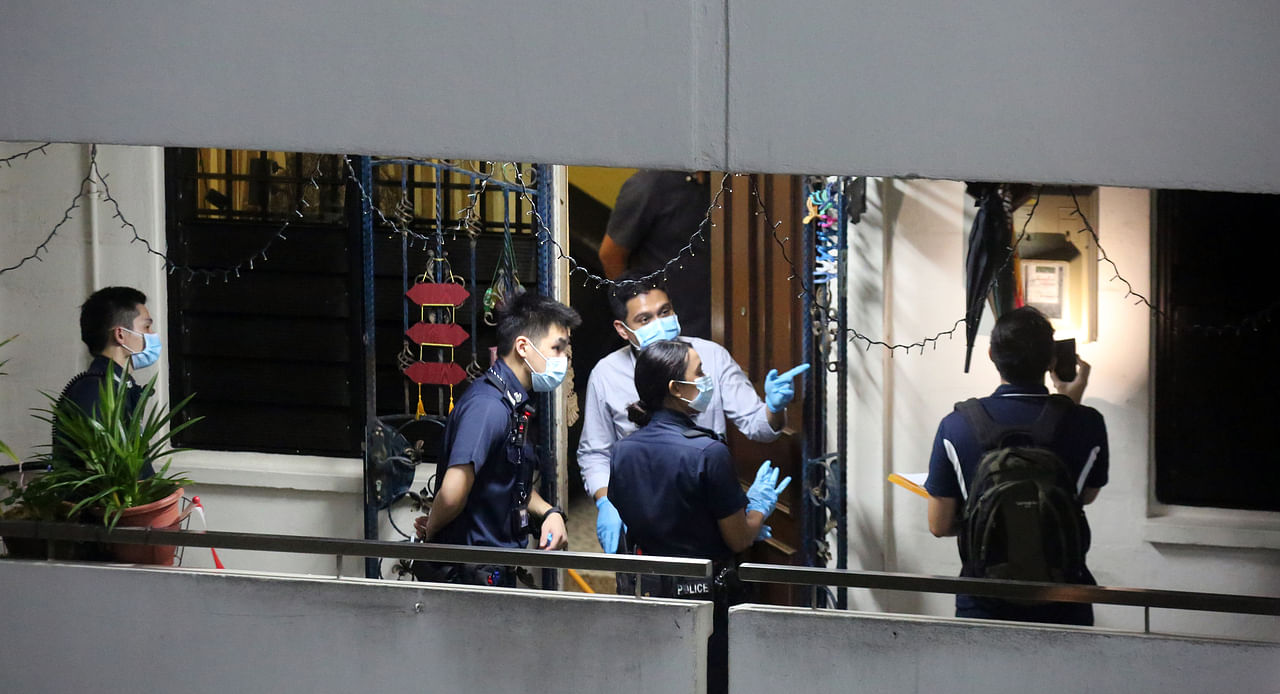Elderly couple and son died after water heater installed in unsafe manner: Coroner's inquiry
Sign up now: Get ST's newsletters delivered to your inbox

The HDB flat at Ho Ching Road, where the elderly couple had lived at since the 1970s.
PHOTO: LIANHE ZAOBAO
Follow topic:
SINGAPORE - An elderly couple and their son were electrocuted because the water heater in the couple’s Ho Ching Road Housing Board flat in Jurong had been installed in an unsafe manner, a coroner’s court heard on Wednesday (March 9).
The tragedy on Dec 10, 2020, claimed the lives of Mr Omar Abdul Manan, 80, his wife Asmah Bujang, 66, and their son Muhamad Ashikin Omar, 45.
Checks showed that a three-pin plug connected to an electrical socket was used to supply power to the heater.
Senior associate engineer Goh Chin Fong from the Energy Market Authority told the court that the heater should have been connected directly to a double-pole switch instead of a wall plug.
Mr Goh, who was providing expert testimony, described the switch as an “on-off switch with an on-off light”.
When investigators disassembled the water heater’s three-pin plug, they also found that the neutral and earth cables had fused together.
As a result, the current flowed back to a heating tank in the water heater. This caused a metallic hose connected to the tank to be energised.
Mr Omar, who was found in the bathroom, is believed to have been electrocuted after touching the hose. Madam Asmah reportedly suffered a similar fate after she rushed in to assist him.
Mr Ashikin, who arrived at the flat later in the afternoon, was also electrocuted when he touched one of his parents.
Following the tragedy, the elderly couple’s daughter told investigators that the water heater was purchased about seven years earlier but she had no clue who installed it.
Mr Goh told State Coroner Adam Nakhoda that the cables in the three-pin plug could have fused together because of overloading.
A double-pole switch is safer as the cables are spaced further apart, minimising the risk of them fusing together.
The court heard that the water heater should have caused a power trip because of the electricity leakage. This would have cut off power to the unit.
But when investigators checked the flat, they found that the residual current circuit breaker (RCCB) did not protect the main electricity circuit for the whole unit. Only the utility room was protected.
The elderly couple had lived at the same flat since the 1970s. Back then, HDB homes were not installed with RCCBs, said Mr Goh.
He added that HDB installed the circuit breakers only from the 1980s and an RCCB was added to the couple’s home following an upgrading exercise about 30 years after they moved in.
However, in their home, it protected only the utility room.
HDB flats in the 1970s also did not have double-pole switches, said Mr Goh, who added that it was because water heaters were not widely used then.
On Wednesday, Station Inspector Mohamed Ariff Mohamed Khair provided details of how Mr Ashikin ended up at the flat.
The police investigation officer said Mr Ashikin’s daughter had visited the flat on the day of the incident when she could not contact her grandparents at around 2pm.
Although she could open the main door, she could not get in as the front gate was locked. But from the corridor, she could hear the sound of running water in the bathroom.
She then alerted her father, who arrived soon after. They entered the flat after he broke a padlock securing the front gate and found the elderly couple in the bathroom.
Station Inspector Ariff said that Mr Ashikin then touched one of them, believed to be Mr Omar, before he collapsed. The girl immediately contacted her mother who alerted the authorities.
Paramedics arrived at the flat and pronounced the elderly couple dead at the scene.
Mr Ashikin was taken to Ng Teng Fong General Hospital but died later.
Station Inspector Ariff told the court that there was no evidence to suggest foul play in the case.
The state coroner will give his findings next month.

